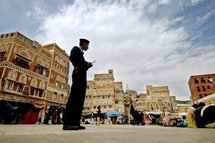Fixing Yemen's economy to challenge donors meeting
Paul Handley
RIYADH, Paul Handley - International donors will meet in Saudi Arabia on Saturday to study how best to deploy billions of dollars to strengthen Yemen's government and stem the rise of violent extremism there.
Yemen's Gulf neighbours and other key donors will discuss with top officials from Sanaa why its economy and government have become more fragile since they pledged 4.7 billion dollars to help in 2006 -- less than 10 percent of which the government has been able to put to use.

A Yemeni policeman stands guard in Sanaa
Led by Yemenis and Saudis, AQAP was behind attempted attacks in Saudi Arabia in the past year, and also claimed the December 25 attempt by a Nigerian to blow up an American passenger jet landing in Detroit.
The failed Christmas plot sparked an urgent international meeting in London in late January, which launched a new effort to help the country.
That meeting decided that, instead of a new round of pledges, donors and Sanaa needed to address why the earlier funds -- 80 percent of which were from the six members of the Gulf Cooperation Council -- have not been put to work.
The Riyadh meeting is also to help broaden understanding of Yemen's needs. In the past, Saudi Arabia, Yemen's biggest neighbour and donor, and the United States have mainly treated Yemen as a security problem.
"The international community agrees we need a comprehensive development approach, not just on security," said Ginny Hill, a Yemen expert at the London think tank Chatham House.
"There's no point making more pledges until they can actually get somewhere" with aid promised four years ago -- 4.7 billion dollars at the November 2006 London conference and another one billion dollars promised later.
Experts blame overly concentrated political power and corruption in the government of President Ali Abdullah Saleh for the inability to manage the funds into projects that would help build Yemen's ramshackle economy, which is plagued by a 40-percent unemployment rate.
But they also blame lack of coordination among donors, and GCC donors' tendency to work through traditional networks rather than more transparent aid mechanisms.
The meeting will be attended by experts from the GCC -- Saudi Arabia, Qatar, Kuwait, Bahrain, Oman and the United Arab Emirates -- the World Bank, the United Nations, the International Monetary Fund, Britain, the European Union, the United States, Japan and others, the GCC has said.
Day one of the two-day meeting will focus heavily on what has gone wrong.
"Nothing can be done quickly" to help Yemen's economy, said Abdulghani al-Iryani, an independent Yemeni development consultant.
"The problem of the dysfunctionality of the Yemen government is a deep structural problem which has to do with the concentration of power," he said.
"There has not been a coherent approach" to helping Yemen, said Christopher Boucek, a Gulf security expert at the Carnegie Endowment for International Peace in Washington.
"They need to figure out priorities," he said.
Other donors are hoping the GCC will join them in urging major reforms on Saleh's government.
"The impression I get is that everybody is very worried, but they are not used to dealing on a multilateral basis," one expert, who spoke on condition of anonymity, said of the Gulf countries.
The meeting could produce one initiative -- a new GCC commitment to bring long-excluded Yemenis into their huge labour markets.
"Worker remittances are very important and can make a difference," said Hill.
However, she said that many Yemenis lack necessary skills and need vocational training programmes.
-------------------------------------------------------------------------